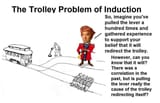>>16776098
> Its always been accurate at every eclipse I have experienced.
Accurate to what level of precision? Seconds? Would you even notice if it was off by 30 seconds? Pure determinism would mean that there is no level of precision too small for us to make accurate predictions if we had "all of the information." Their computers can predict down to the femtosecond if they want to, they'll be lucky if they are even in the same minute.
> Probabilities aren't calculations, they are estimation ranges.
You're a moron. If you have a set of N random variables, x_1, x_2, ... , x_N, which are drawn from the same distribution, you can predict their average via the sample mean or sample median. As that N grows, for most real use cases, that sample mean will approach a fixed number.
That doesn't mean you can exactly predict x_{N+1}. The next sample will always be random, but you still get convergence in the posterior mean.
It is entirely possible for the universe to be stochastic in a way that for individual realizations there are small bits of randomness, but those bits of randomness "average out" to a satisfactory degree of precision.
That convergence doesn't mean that those x_i samples are "pseudo-random," it means they are samples of a distribution with a stable mean.
Most predictions in deterministic physics correspond to posterior means. They give us our best guess at the average based on the previous set of observations. The reason they do this is that sample means generally converge, are stable, and usually will minimize the error between the prediction and the truth.
That error will never become zero. It will always be there, but you can minimize it (in a minimum variance sense) via a posterior mean.



